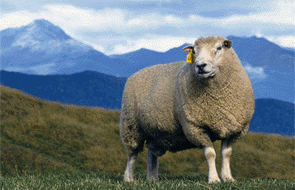
By Allan Barber
The state owned farmer Landcorp last month reported a substantial drop in both revenue and profit for the six months ended 31 December last year, but CEO Steve Carden is still very positive about future prospects and the importance of Landcorp as a farming business.
In response to a question about the impact of dairy and whether the exposure to it has gone too far, he said he felt the balance was about right at a similar proportion to red meat which had traditionally been the dominant farming type.
Dairy represented over half the turnover last year, but in the current year that percentage had fallen to 46%, as evident from the almost $10 million decline in first half year revenue.
Carden expressed concern about the volatility in the dairy price which was responsible for the reduction in Landcorp’s top and bottom line, but in spite of the improvement in beef and sheepmeat returns, he doesn’t believe beef and dairy are genuinely counter cyclical. All commodity markets are more likely to be up or down at the same time.
Three major initiatives across Landcorp’s business reflect the added value direction the company is moving in: the share milking agreement with Shanghai Pengxin, supply of lamb to Silver Fern Farms for sale to Tesco, and the partnership with NZ Merino for the total coarse wool clip.
Shanghai Pengxin has invested $80 million in improving the farms which were acquired in a very high profile transaction involving OIO approval following the Crafar Farms receivership. Landcorp is working very hard to make the relationship work, while playing its part in ensuring the partnership meets the OIO’s requirements including environmental regulations. Longer term this arrangement will contribute significantly to Landcorp’s profitability.
The Tesco contract for lamb supply is based on tight specification lambs of 17kg carcase weight bred from Romney ewes and Landcorp Supreme terminal breed rams which are a composite of Texel, Romney and Poll Dorset. This delivers lean, high yielding, big lambs with no fat which is what Tesco specifically wants.
That said, the relationship with Tesco which is managed by SFF is hard work and involves constant renegotiation on price.
Landcorp also supplies lambs to Alliance, beef to ANZCO and SFF and venison to SFF, all companies chosen because they share Landcorp’s vision for adding value.
However Carden says New Zealand meat companies have tended to be very inwardly focused at the expense of the market.
The third initiative is the arrangement with NZ Merino to market coarse wool which may at first glance seem to be a contradiction in terms. However, according to Carden, the relationship has already reenergised the attitude of Landcorp’s staff members who were previously inclined to devalue wool as just an animal health exercise.
Under the previous method of selling through the auction system, Landcorp had tried to obtain forward contracts without success and could gain no visibility of wool returns. The initial three year NZM arrangement has brought a new marketing focus to the product, based on an ability to differentiate the product and explore end uses other than carpets.
NZM has worked with Landcorp’s farm staff on wool handling to optimise the value of the clip.
This process is starting to provide transparency of returns, as well as identifying new partners to work with for greater returns, but the biggest gain is the clear evidence of greater enthusiasm from staff.
In answer to a broader question about the value to the taxpayer from state ownership of Landcorp, although public ownership may need to be debated Carden’s opinion is Landcorp has a unique scale and spread of activities which would be unlikely to be possible in private ownership.
The company is able to carry out a range of work on farm and in market which provides a barometer for all types of farming and a model for other farmers to pursue.
Ultimately the vision is to run a large scale farm business which is highly profitable and instils pride in public ownership.
To subscribe to our weekly Rural email, enter your email address here.
Farms For Sale: the most up-to-date and comprehensive listing of working farms in New Zealand, here »
Here are some links for updated prices for
- lamb
- beef
- deer
- wool
Y Lamb
Select chart tabs
-----------------------------
Allan Barber is a commentator on agribusiness, especially the meat industry, and lives in the Matakana Wine Country where he runs a boutique B&B with his wife. He is chairman of the Warkworth A&P Show Committee. You can contact him by email at allan@barberstrategic.co.nz or read his blog here ». This article was first published in Farmers Weekly. It is here with permission.

We welcome your comments below. If you are not already registered, please register to comment
Remember we welcome robust, respectful and insightful debate. We don't welcome abusive or defamatory comments and will de-register those repeatedly making such comments. Our current comment policy is here.